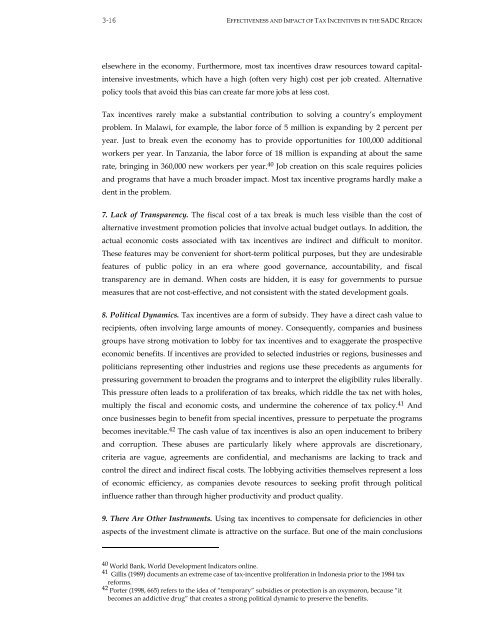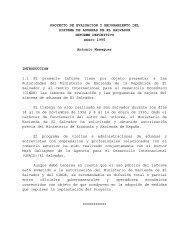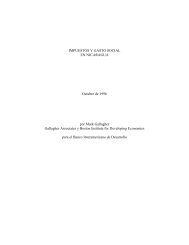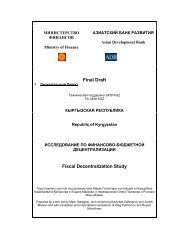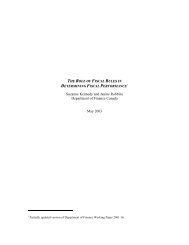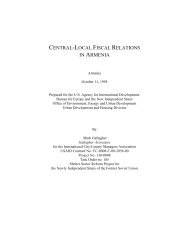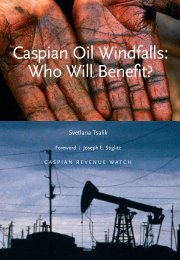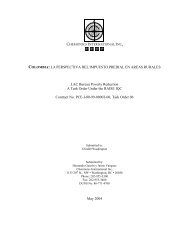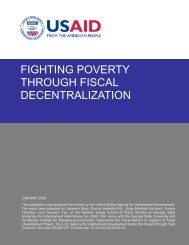Effectiveness and Economic Impact of Tax Incentives in the SADC ...
Effectiveness and Economic Impact of Tax Incentives in the SADC ...
Effectiveness and Economic Impact of Tax Incentives in the SADC ...
Create successful ePaper yourself
Turn your PDF publications into a flip-book with our unique Google optimized e-Paper software.
3-16 EFFECTIVENESS AND IMPACT OF TAX INCENTIVES IN THE <strong>SADC</strong> REGION<br />
elsewhere <strong>in</strong> <strong>the</strong> economy. Fur<strong>the</strong>rmore, most tax <strong>in</strong>centives draw resources toward capital-<br />
<strong>in</strong>tensive <strong>in</strong>vestments, which have a high (<strong>of</strong>ten very high) cost per job created. Alternative<br />
policy tools that avoid this bias can create far more jobs at less cost.<br />
<strong>Tax</strong> <strong>in</strong>centives rarely make a substantial contribution to solv<strong>in</strong>g a country’s employment<br />
problem. In Malawi, for example, <strong>the</strong> labor force <strong>of</strong> 5 million is exp<strong>and</strong><strong>in</strong>g by 2 percent per<br />
year. Just to break even <strong>the</strong> economy has to provide opportunities for 100,000 additional<br />
workers per year. In Tanzania, <strong>the</strong> labor force <strong>of</strong> 18 million is exp<strong>and</strong><strong>in</strong>g at about <strong>the</strong> same<br />
rate, br<strong>in</strong>g<strong>in</strong>g <strong>in</strong> 360,000 new workers per year. 40 Job creation on this scale requires policies<br />
<strong>and</strong> programs that have a much broader impact. Most tax <strong>in</strong>centive programs hardly make a<br />
dent <strong>in</strong> <strong>the</strong> problem.<br />
7. Lack <strong>of</strong> Transparency. The fiscal cost <strong>of</strong> a tax break is much less visible than <strong>the</strong> cost <strong>of</strong><br />
alternative <strong>in</strong>vestment promotion policies that <strong>in</strong>volve actual budget outlays. In addition, <strong>the</strong><br />
actual economic costs associated with tax <strong>in</strong>centives are <strong>in</strong>direct <strong>and</strong> difficult to monitor.<br />
These features may be convenient for short-term political purposes, but <strong>the</strong>y are undesirable<br />
features <strong>of</strong> public policy <strong>in</strong> an era where good governance, accountability, <strong>and</strong> fiscal<br />
transparency are <strong>in</strong> dem<strong>and</strong>. When costs are hidden, it is easy for governments to pursue<br />
measures that are not cost-effective, <strong>and</strong> not consistent with <strong>the</strong> stated development goals.<br />
8. Political Dynamics. <strong>Tax</strong> <strong>in</strong>centives are a form <strong>of</strong> subsidy. They have a direct cash value to<br />
recipients, <strong>of</strong>ten <strong>in</strong>volv<strong>in</strong>g large amounts <strong>of</strong> money. Consequently, companies <strong>and</strong> bus<strong>in</strong>ess<br />
groups have strong motivation to lobby for tax <strong>in</strong>centives <strong>and</strong> to exaggerate <strong>the</strong> prospective<br />
economic benefits. If <strong>in</strong>centives are provided to selected <strong>in</strong>dustries or regions, bus<strong>in</strong>esses <strong>and</strong><br />
politicians represent<strong>in</strong>g o<strong>the</strong>r <strong>in</strong>dustries <strong>and</strong> regions use <strong>the</strong>se precedents as arguments for<br />
pressur<strong>in</strong>g government to broaden <strong>the</strong> programs <strong>and</strong> to <strong>in</strong>terpret <strong>the</strong> eligibility rules liberally.<br />
This pressure <strong>of</strong>ten leads to a proliferation <strong>of</strong> tax breaks, which riddle <strong>the</strong> tax net with holes,<br />
multiply <strong>the</strong> fiscal <strong>and</strong> economic costs, <strong>and</strong> underm<strong>in</strong>e <strong>the</strong> coherence <strong>of</strong> tax policy. 41 And<br />
once bus<strong>in</strong>esses beg<strong>in</strong> to benefit from special <strong>in</strong>centives, pressure to perpetuate <strong>the</strong> programs<br />
becomes <strong>in</strong>evitable. 42 The cash value <strong>of</strong> tax <strong>in</strong>centives is also an open <strong>in</strong>ducement to bribery<br />
<strong>and</strong> corruption. These abuses are particularly likely where approvals are discretionary,<br />
criteria are vague, agreements are confidential, <strong>and</strong> mechanisms are lack<strong>in</strong>g to track <strong>and</strong><br />
control <strong>the</strong> direct <strong>and</strong> <strong>in</strong>direct fiscal costs. The lobby<strong>in</strong>g activities <strong>the</strong>mselves represent a loss<br />
<strong>of</strong> economic efficiency, as companies devote resources to seek<strong>in</strong>g pr<strong>of</strong>it through political<br />
<strong>in</strong>fluence ra<strong>the</strong>r than through higher productivity <strong>and</strong> product quality.<br />
9. There Are O<strong>the</strong>r Instruments. Us<strong>in</strong>g tax <strong>in</strong>centives to compensate for deficiencies <strong>in</strong> o<strong>the</strong>r<br />
aspects <strong>of</strong> <strong>the</strong> <strong>in</strong>vestment climate is attractive on <strong>the</strong> surface. But one <strong>of</strong> <strong>the</strong> ma<strong>in</strong> conclusions<br />
40 World Bank, World Development Indicators onl<strong>in</strong>e.<br />
41 Gillis (1989) documents an extreme case <strong>of</strong> tax-<strong>in</strong>centive proliferation <strong>in</strong> Indonesia prior to <strong>the</strong> 1984 tax<br />
reforms.<br />
42 Porter (1998, 665) refers to <strong>the</strong> idea <strong>of</strong> “temporary” subsidies or protection is an oxymoron, because “it<br />
becomes an addictive drug” that creates a strong political dynamic to preserve <strong>the</strong> benefits.


